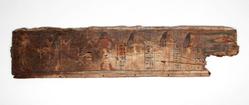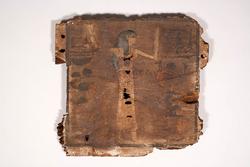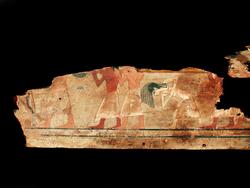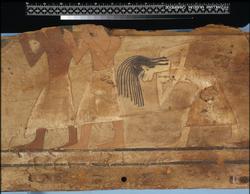Current Location: Gallery 19
Titles
Painted wood coffin
Entities
Categories
Description
Wooden planks from a box coffin.The planks are water and termite damaged. On the exterior are scenes related to the funeral of the deceased, including the funeral procession itself, offering bearers carrying items into the tomb and also the coffin (now lost), and women mourning. A single eye appears on one long side, and there are traces indicating that a single eye was painted on the other side too. This is most likely because the body lay on its back inside the coffin, rather than on its side and close to the eye-panel, as was typical with earlier coffins.
The coffin is made mostly of sycomore fig, with dowels of sidr. The long sides and the foot panel were probably constructed from single, full-depth planks. The head panel was constructed from two planks (the upper of sidr) of approximately equal depth roughly fitted together with two pegged mortise and tenon joints (from which the tenons are now lost). The coffin parts were joined at the corners with wide dovetails, secured with dowels. Regularly spaced, horizontal dowel holes along the bottom of the long panels show where the coffin base was attached. Vertical dowel holes in the undersides of the end panels suggest that these panels (which are not as tall as the side panels) were fixed onto the top of the base board.
The painted surface is heavily discoloured and abraded, making it difficult to assess the original colour scheme. The background appears to have been yellow, painted with yellow earth/jarosite on the long panels and orpiment on the head and panel. However, there is evidence of a mixture of earth and orpiment in some locations. A thin white calcite, gypsum and bassanite preparation layer was applied underneath. The black underdrawing and central setting-out line can also be seen with infrared reflectography on the end panels.
These coffin planks were discovered by John Garstang at Abydos in 1900. Despite the fact it is box-shaped, which is typical of the Middle Kingdom, scenes like this which relate to the funeral of the deceased are not known before the end of the Second Intermediate Period.
Measurements and weight
Sides : 42 x 187 x 1.7 cm 33 x 161 x 1.7 cm
Ends : 38 x 36 x 1.7 cm
At the moment, this record does not display units or type of
measurements. We will rectify this as soon as possible.
Acquisition and important dates
Method of acquisition: Given
(1900)
by
the Egyptian Research Account
Dating
17th Dynasty
-1680
BCE
-
-1510
BCE
Materials used in production
Wood
Techniques used in production
Painted
References and bibliographic entries
Related exhibitions
Identification numbers
Accession number: E.283.1900
Primary reference Number: 50300
Stable URI
Audit data
Created: Saturday 6 August 2011
Updated: Friday 18 July 2025
Last processed: Thursday 27 November 2025
Associated departments & institutions
Owner or interested party:
The Fitzwilliam Museum
Associated department:
Antiquities
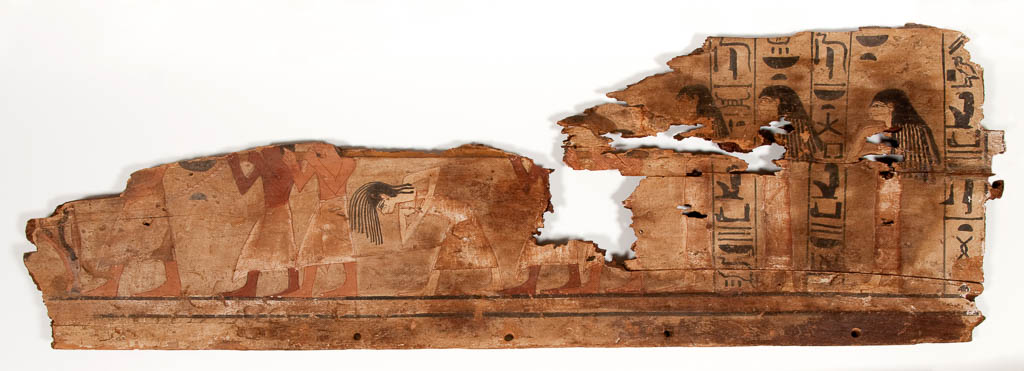
 IIIF Manifest
IIIF Manifest
